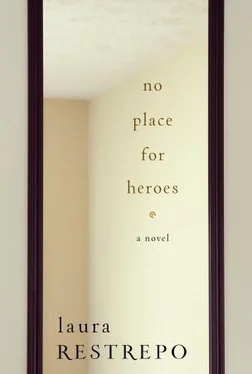“The first thing I needed was money,” she told Mateo, “a lot of money, for the tickets, hotels, travel documents, contacts. And for other things, but basically those. Mamaíta was an angel. Strong and supportive, as she was anytime there was a crisis in the family. I told her how much money I was going to need and she found it right away and handed it to me. Then I had to take care of a bunch of legal matters that would help me if there was to be a custody fight. It was likely to happen, and being a foreigner, the law was not going to be on my side. I also had to get passports. My legal one and a fake one for you, in case Ramón decided to keep yours, plus two other sets of pictures of you, of me, names and nationalities changed and with all the necessary seals. Your father was an expert at falsifying papers and I wasn’t. But in Colombia it is as easy as pie to buy a passport. So all that on one end. Ah, and the suitcase. I found one with a double compartment. You should have seen this suitcase, Mateo, this was no toy, but a thing for professionals. So there, ready and sitting by the bed, I kept a suitcase with my clothes and extra clothes for you, because I knew you’d need them. And to top off our grand scheme, Guadalupe and I racked our brains for alternative escape routes out of Argentina, not only by air but also by land. Across the border into Chile or Uruguay, and finally across the border into Brazil. That, plus the contacts at different points, friends who were willing to help. It was a well-planned operation. I had learned something from my clandestine meanderings in the resistance.”
All this would only work if Mateo was indeed in Argentina, which was only a guess. But the signs pointing to it were plenty. First of all, it was obvious that Ramón would want to return to his own country, where he would be the local and she the foreigner. Second, Ramón had asked her to pack cold-weather clothes for the boy, and though many parts of the world were getting ready for summer, in Argentina it was the start of winter. Third, Haddad thought that if Ramón’s goal was to win her back, he was going to do it on his own territory. In Colombia, things had gone so badly for them that the relationship had shattered. But in Argentina, they had been in love. It was likely that he would want to lead her to the place where they had been happy.
“Smart guy, that Haddad,” Mateo said.
“Yes, but another assumption came into play there, that Ramón’s letter was a love letter.”
“And if it was a love letter, why set up such a Mission Impossible to save me?”
“That’s the thing, kiddo, his letter might have been about love, but his actions were acts of war.”
“Great way to put it, Lolé, I’m really liking this movie.”
“Wait, now is when it gets ugly.”

SOON AFTER THE incident with the police in Las Violetas, Aurelia began to meet Forcás at El Molino Azul, a telo in Buenos Aires — tel-ho: ho-tel backward, a hotel by the hour for couples. What a whimsical contraption memory is! She remembered the exterior details of the building, a cement bunker, a kind of eternal monument to momentary love. But inside? Completely a blank. She strained to remember a single object, however insignificant, which would bring back the atmosphere of those afternoons. A blanket, say, a stiff blanket cold to the touch, the color of a dark sea. Or like red wine? Why not. It could well have been a satiny old thing the color of wine, or fading raspberry. A depressing thing under any other circumstance. And the plastic curtain in the shower. It should be yellow or a yellowed white. Or was it green? Pistachio green with printed bubbles, that’s what it was. How tenaciously that green curtain had lurked in the dark corners of her memory. But Lorenza was able to snatch it out and she kept casting her line to see what else she could catch in that miraculous fishing expedition, until the pair of teacups appeared, delivered by room service through a gyrating window, pale lukewarm water barely darkened by the musty tea bags and sugar cubes. But not that much else.
Her curiosity about that Molino Azul of her memory had made her, years before, place a call from Bogotá to Felicitas Otamendi, one of her best Argentinean friends, at her law offices in Buenos Aires, to ask for a strange favor. When she had a second, would she drop by that telo named El Molino Azul to tell her what it looked like? Could it still exist? No, Lorenza did not remember what street it was on, she just said that it was an ugly, gray cement building, five or six stories high.
Felicitas agreed to go right away and sent Lorenza her first fax: “This is too juicy, my dear! I have found not only that El Molino Azul still exists but that they offer different types of rooms. Do you want the cheapest one? Or deluxe? A Scottish shower or a Roman bath? It’s on Salguero Street and yesterday I passed by to check it out from the outside. It’s definitely still there, but the façade isn’t gray like you remember, but a milky mulberry color. I’m going back on Thursday, this time to go in the rooms, with a friend who has agreed to come just to play along. Ciao, Felicitas.”
So the façade was not gray. Maybe they’d painted it. Or was it those rainy afternoons that were gray? Definitely the first time they had met up in the telo it had been raining buckets, Lorenza could at least swear to that. Buenos Aires had disappeared under the downpour.
Less than a week later, Felicitas was sending a detailed report:
“The front door is discreet,” it said. “There are no signs or anything else that would identify the place as a transitory lodging. But on one of the outside walls, there’s the painting of a great windmill, obviously blue. You first go into a small room with the cash register on the left, behind a mirrored glass which hides the cashier.” Right, right, now that Felicitas mentioned it, it was as if Lorenza were watching the anonymous hand that would slip them the key through a slot in the smoked glass. The key to happiness? For a while anyway, because after a couple of hours the noise of a bell would startle them: either they left the room or they would have to pay double. Felicitas described a plaster fountain with a tiny angel, somewhat metaphorical, holding an amphora that poured out a stream of froth over a seashell. Felicitas and her friend had paid the cashier the equivalent of ten dollars, which had secured them one of the deluxe rooms for an hour. “It smelled like cheap and cloying air freshener, a mixture of marmalade and disinfectant, a smell characteristic of all the telos in the world, as I know from experience,” she had written.
Yes, that must have been the smell. But the angel, the froth, the seashell? They must not have been there back then, or she didn’t remember. “The room is about five meters by five meters wide and is decorated in shoddy art deco.” Once they were inside, Felicitas and her friend had amused themselves taking pictures that they eventually sent to Lorenza. They posed in front of the painted cardboard faux-stone, both very tall and very marvelous in their coats, boots, and scarves, on the bed, in the bathroom and facing the mirrors, specifically a huge, hexagonal mirror, with uneven sides, that by all accounts was the pièce de résistance of the set. Those afternoons in El Molino Azul, in the Buenos Aires of the dictatorship. The memory of a long line of couples slowly returned to Lorenza, very young men and women, just as they themselves must have been. They waited for their rooms embracing each other or holding hands, chatting in low voices, not betraying any shame, or need for secrecy, or modesty, as if they were waiting in line at the movies. During the week it wasn’t very crowded, but Fridays and Saturdays there was a long wait. In general, they didn’t see too many bosses with their secretaries, or prostitutes with their johns, or adulterous affairs; what they saw was mostly students, the type who still lived with his parents and saved up during the week to take his girl to a refuge as far removed from parental control as possible. There was no one there who would insult them, who would point an accusing finger or create a stir. That telo with its wine-dark satin blankets, its cups of cold tea, its disinfectant smells, had been for them a liberated land amid the demoralizing violence of those times. Because of the occupational hazards of the resistance, Aurelia and Forcás could not know where the other lived, and so for many afternoons, El Molino Azul took them in as if it were their home.
Читать дальше













